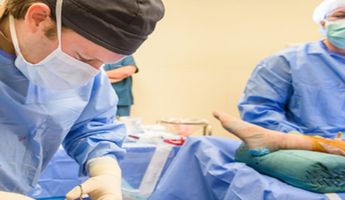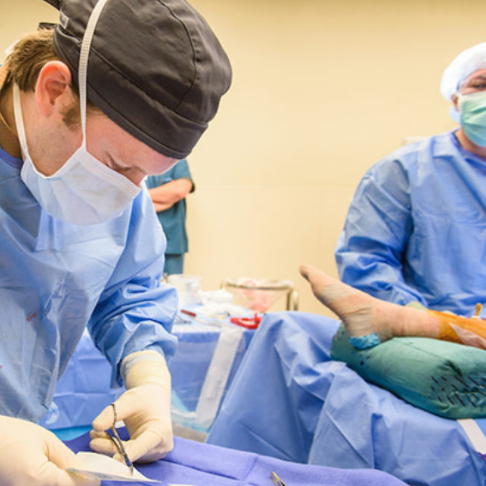Tendon Repair in Lebanon
Search and Compare the Best Clinics and Doctors at the Lowest Prices for Tendon Repair in Lebanon

Find the best clinics for Tendon Repair in Lebanon
No clinics available
Russian Federation offers the best prices Worldwide
Price: $ 828

- Home
- Lebanon
WHY US?
At Medijump, we're making medical easy. You can search, compare, discuss, and book your medical all in one place. We open the door to the best medical providers worldwide, saving you time and energy along the way, and it's all for FREE, no hidden fees, and no price markups guaranteed. So what are you waiting for?

Free

Best Price

Widest Selection

Risk-Free
What you need to know about Tendon Repair in Lebanon

Tendon repair is a surgical procedure to treat a torn or damaged tendon – the soft stretchy tissues that connect muscles to the bone and helps to protect joints from damage. The purpose of Tendon Repair is to restore normal movement to a joint as tendon injuries are very painful and can make it difficult to move. Tendon repair is mostly performed on people with a deep cut that severs a tendon, an injury, or tears due to rheumatoid arthritis, or an injury from contact sports.
What does a Tendon Repair Procedure Involve?
Tendon repair surgery can be performed under local, regional, or general anesthetic, depending on your medical history and the location of the affected tendon. The procedure starts by making an incision in the skin over the injured tendon, then any damaged tendon is removed and the ends of the torn tendon are sewed together. The final step is closing the incision with sutures and covering the area with sterile dressing or bandages.
How Long Should I Stay in Lebanon for a Tendon Repair Procedure?
Although tendon repairs are usually performed as an outpatient procedure (meaning you can leave the hospital on the same day of the surgery), you should aim to stay in Lebanon for 5 to 7 days. As you will need to attend follow-up hospital checkups where your surgeon will remove the stitches and monitor your healing
What's the Recovery Time for Tendon Repair Procedures in Lebanon?
The total period for recovery can take around 12 weeks, but you should rest for 6 weeks to aid a speedy recovery. Make sure to ask your doctor about the recovery timeline. Also, remember that you should avoid doing any exercises (including therapy exercises) until your surgeon allows you to do so.
What sort of Aftercare is Required for Tendon Repair Procedures in Lebanon?
Your surgeon will give you aftercare instructions, which may include wound care and dietary restrictions. For the first few days following the surgery, make sure to keep the affected area elevated to avoid swelling and pain. Your surgeon may also recommend physical therapy or occupational therapy exercises to regain your range of motion.
What's the Success Rate of Tendon Repair Procedures in Lebanon?
The sooner the procedure is carried out after injury, the higher the success rate. However, there are some minor side effects and risks associated with the procedure, including loss of joint use, re-tearing of the tendon, stiffness of the joint, scar tissue, as well as problems with anesthesia.
Are there Alternatives to Tendon Repair Procedures in Lebanon?
Physical therapy can be an alternative if you do not want to undergo surgery, but in some severe cases, you need both surgery and physical therapy to treat your damaged tendon effectively.
What Should You Expect Before and After the Procedure
Before a Tendon repair, your movement and mobility may be limited as it can be very painful for you to move a joint. After the surgery, you should slowly regain your range of motion. Once you have recovered fully, you may be able to move like you used to before the damage to your tendon.
Whilst the information presented here has been accurately sourced and verified by a medical professional for its accuracy, it is still advised to consult with your doctor before pursuing a medical treatment at one of the listed medical providers
No Time?
Tell us what you're looking for and we'll reachout to the top clinics all at once
Enquire Now

Popular Procedures in Lebanon
Prices Start From $1,376

Prices Start From $125

Prices Start From $2,050

Prices Start From $15

Recommended Medical Centers in Lebanon for procedures similar to Tendon Repair

- Interpreter services
- Translation service
- Religious facilities
- Medical records transfer
- Medical travel insurance
- Health insurance coordination
- TV in the room
- Safe in the room
- Phone in the room
- Private rooms for patients available

- Interpreter services
- Translation service
- Religious facilities
- Medical records transfer
- Medical travel insurance
- Health insurance coordination
- TV in the room
- Safe in the room
- Phone in the room
- Private rooms for patients available

- Interpreter services
- Translation service
- Religious facilities
- Medical records transfer
- Medical travel insurance
- Health insurance coordination
- TV in the room
- Safe in the room
- Phone in the room
- Private rooms for patients available

- Interpreter services
- Translation service
- Religious facilities
- Medical records transfer
- Medical travel insurance
- Health insurance coordination
- TV in the room
- Safe in the room
- Phone in the room
- Private rooms for patients available
Tendon Repair in and around Lebanon
Lebanon, a country on the eastern shore of the Mediterranean Sea, is one of the smallest sovereign states. The country boasts a fascinating mixture of the Middle East and the West, Christianity, and Islam, and tradition and modernity. It has everything from golden beaches and World Heritage Sites to energetic nightlife and delicious cuisine. Among other countries in the Middle East, Lebanon appears to be one of the most popular medical tourism destinations. Over 10% of the tourists visiting the country, particularly from neighboring countries, come to receive medical care. Many hospitals and clinics in the country are accredited to the ISO:9000 standard and offer world-class specialist services in spine treatment, orthopedics, organ transplant, and other complex surgeries, as well as advanced cancer treatments. Cosmetic and reconstructive surgery are also popular.
Popular Parts of Lebanon
Beirut, the capital and largest city of Lebanon, is filled with historic landmarks and natural wonders. The most famous attractions in the city are the National Museum of Beirut, the Corniche and Pigeon Rocks, Sursock Museum, and Mohammed Al Amin Mosque. Many people also come to Lebanon to visit the port town of Sidon. Once a rich and thriving Phoenician city, it is dotted with historical monuments and ancient remnants, particularly in its Old City. Other popular cities include Tripoly, Baalbek, Byblos, and Tyre.
Weather and Climate in Lebanon
Lebanon has four seasons: winter (December to March), spring (April to May), summer (June to September), and autumn (October to November). Winter is the rainy season with high precipitation levels and cool temperatures. It is snowy in the mountains, but in some places, such as Beirut, it just rains during this season. Summer is hot, sunny, and dry, and can get very humid in cities located close to the sea. In the summer, the average temperatures are around 28°C to 30°C. Spring and autumn are both warm and pleasant.
Getting around in Lebanon
The main international airport where visitors fly into and out of Lebanon is Beirut–Rafic Hariri International Airport, which is the only operational commercial airport in the country. It serves international flights to numerous major cities across Europe and the Middle East, including Moscow, Paris, London, and Dubai. Given the small size of the country, there are no internal flights. Intercity buses and minibus are available and have an extensive network, especially in coastal areas. The best way to get around the country is by hiring a car (with a driver) or by using intercity taxis.
Tourist Visas in Lebanon
All visitors need to obtain a visa to enter and stay in Lebanon unless they come from one of the seven visa-exempt countries (including Kuwait, Bahrain, Qatar, Saudi Arabia, Oman, the United Arab Emirates, and Jordan). Citizens of 81 countries, including all EU countries, Australia, China, Canada, and the United States, are eligible for a visa on arrival for a maximum stay of 30 days. A conditional visa on arrival is available for citizens of 15 countries, including Algeria, Libya, Iraq, and Yemen.
Additional Information
- Local Currency: Lebanese Pound (LBP) is the official currency in Lebanon. 1 USD is equivalent to around 1,507 LBP. US dollars and the euro is widely accepted as well.
- Money & Payments: ATMs are widely available in many places around Beirut and other large cities. Many ATMs dispense both US dollars and Lebanese pounds. Credit cards, particularly Visa and MasterCard, are accepted at most major establishments. Tipping can be expected, usually around 10% to 15% of the bill.
- Local Language: Arabic is the official language in Lebanon. English and French are widely spoken as well, and many Lebanese can speak at least two to three languages.
- Local Culture and Religion: Islam (around 60% of the population) and Christianity (around 34%) are the primary religions in Lebanon. About 5% of Lebanese practice the Druze faith, while other religions are practiced by the remaining 1% of the population.
- Public holidays: New Year’s Day, Christmas Day, Eid al-Fitr, Eid al-Adha, All Saints’ Day, Resistance and Liberation Day, as well as Independence Day are some of the more important holidays in Lebanon.
Popular Searches
- Plastic Surgery in Thailand
- Dental Implants in Thailand
- Hair Transplant in Thailand
- Breast Augmentation Thailand
- Gastric Sleeve in Thailand
- Gender Reassignment Surgery in Thailand
- Laser Hair Removal in Bangkok
- Botox in Bangkok
- Dermatology in Bangkok
- Breast Augmentation in Bangkok
- Coolsculpting in Bangkok
- Veneers in Turkey
- Hair Transplant in Turkey
- Rhinoplasty in Turkey
- Stem Cell Therapy in Mexico
- Rhinoplasty in Mexico
- Liposuction in Mexico
- Coolsculpting in Tijuana
- Rhinoplasty in Korea
- Scar Removal in Korea
- Gastric Sleeve in Turkey
- Bone Marrow Transplant in India
- Invisalign in Malaysia
- Plastic Surgery in the Dominican Republic
- Tummy Tuck in the Dominican Republic
- Plastic and Cosmetic Surgery in Poland
- Rhinoplasty in Poland
- Hair Implant in Poland
- Dental Implants in Poland
- IVF in Turkey